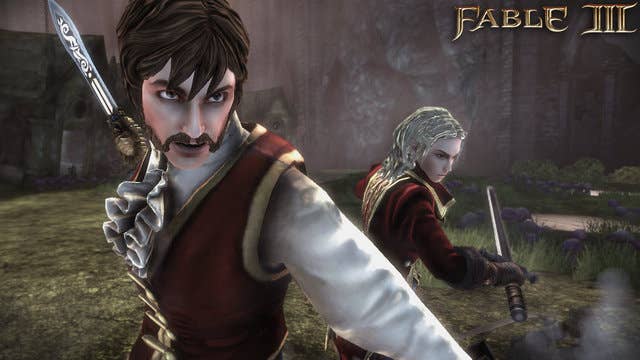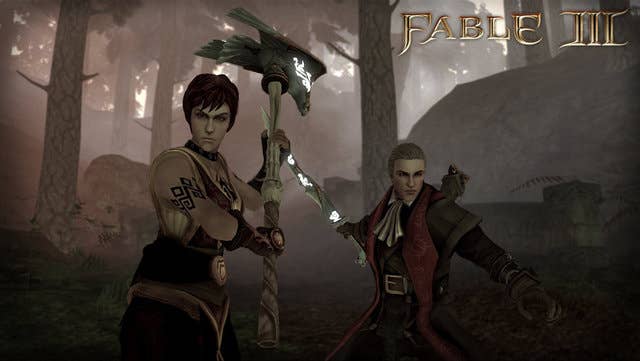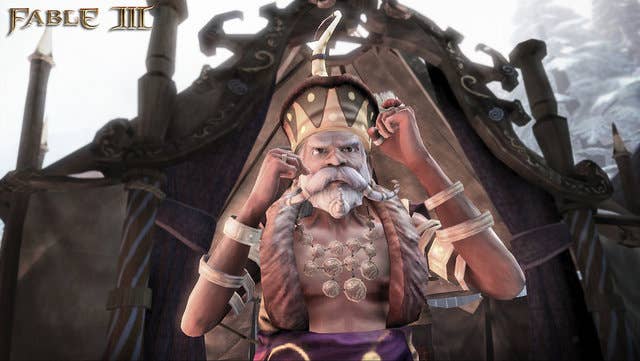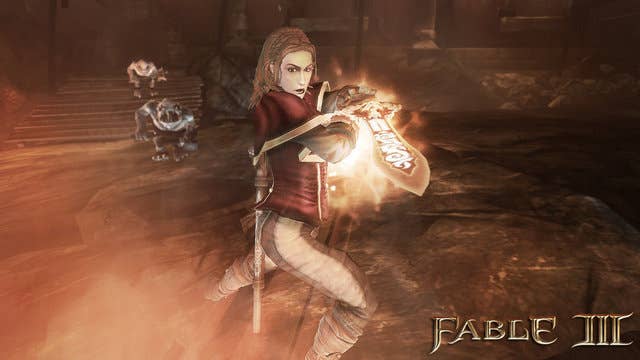Critical Consensus: Fable III
Long live the king?
The Fable series has become one of Microsoft's flagship games; platform exclusive, created by one of the most talented and storied studios in the UK, in turn led by one of the industry's most colourful characters. It's a series which generally does extremely well, both in terms of critical reception and at retail, but there are almost always glaring caveats to whatever praise reviewers pile upon it.
Plagued as much by the almost impossible ambitions of Molyneux as it is by bugs and simple omissions, the series has nonetheless charmed its way into the hearts and minds of a generation of Xbox owners. Fable II was a clear improvement on the first - deepening the experience in almost every aspect while rendering it simultaneously more accessible and rewarding - but can the difficult third instalment keep up that trend?
We take a look at reviews from some of the most respected sites around the web to find out, taking on board points from across the score spectrum to give you a picture of how the game's been received.
This week, we'll begin at the positive end of the scale, with GameInformer's 9/10 eulogy of Fable's many virtues. Jeff Cork's review runs through a quick discussion of the game's mechanics and systems, before settling on what he clearly feels are the games' strengths: story and sense of place.
Levelling up has had something of a facelift since Fable II, with traditional XP-based progression giving way to a more direct representation of progression. While it's nice to look at, says Cork, it's not really the overhaul which it purports to be.
"Character progression eschews a traditional levelling system in favour of a more literal experience system dubbed the Road to Rule," he writes. "In the beginning, the hero faces down a winding path that ends at the castle. Gates block your progression, and are unlocked one by one after completing important story-based tasks. As players work their way through the path, they can spend Guild Seals (essentially XP) to open chests. Those chests contain things like combat upgrades, emotion packs, dyes for clothing, and new spells. It's a nice way to present levelling up, though it doesn't fundamentally change the mechanics beneath such systems. "
As with many reviews, Cork's also singles out Fable III's unusual menu system for some attention, and like most commenters, Cork's reactions to the system are similarly mixed.
"Staffed by Jasper the butler (voiced by John Cleese), it's an all-in-one visual replacement for the various menus players usually zip through to equip gear, fast travel, and change appearance.

"Lionhead's efforts to replace abstract gaming concepts with more literal interpretations is interesting, but the overall effect is one of getting a flashy paint job instead of an arguably unnecessary overhaul. Sure, menus are weird gamey things, but there's a reason they work - they're faster than walking into a virtual closet. The interface doesn't take anything away, but it doesn't add anything extra to the experience, either."
Moving on from the design choices of the interface, Cork begins to find more to applaud - particularly the new-found depth and ramifications offered by the series' trademark moral choices.
"The Fable series has always focused on morality, and Fable III is no different. This time, however, the choices are far beyond the typical 'kiss the baby or kick the baby' extremes that we've faced in the past. My first playthrough I was as evil as evil could be, and I broke my word at every opportunity. Every decision I made was born from greed, and I lined by bank account and bought up every square inch of available property. When the time of reckoning came, the kingdom suffered because of my greed.
"On my second attempt, I decided I would be daddy's li'l angel. I went out of my way to be good to everyone, and I kept every promise. My advisor warned me that popularity would be fleeting if everyone died because of the kingdom's insolvency, but I didn't care. People cheered when I entered the throne room, and it felt great (particularly compared to my earlier reception). And wouldn't you know it? Just about everyone died."
For Cork, this is the finest yet of a fine trilogy, a feat which owes a great deal to the realisation of the engaging kingdom of Albion.
"From raising a family, becoming a land baron, and even partnering up with friends locally or online, this is the most fully realized version of Albion yet," Cork concludes. "It's a must-play for fans of adventure or anyone who thinks they can run things better than those bums in Washington. Good luck."
One things GameInformer's review doesn't touch on is the bugs and glitches which spoiled the first two games for many players. It's a subject which almost all other reviews mention, and some make much of, as we see in this piece from The Escapist, which awards an 8/10 despite the lack of polish raising the ire of reviewer Susan Arendt.

"Fable 3's gripping story keeps you charging forward, eager to find out what happens next, while its cheeky sense of humor takes the edge off the coming storm. Its voice acting and stunning imagery create an Albion that feels like a real place, with real people," writes Arendt.
"And then one of the game's many bugs slaps you in the face and ruins everything."
"The glittering breadcrumb trail leading you to your next destination will disappear or point you in the wrong direction. Sound drops out. Characters will get stuck, disappear, or just completely stop, sometimes making it impossible to keep playing. Many of these are the same problems that plagued Fable 2, and Lionhead's failure to fix them is pretty damn inexcusable. Yes, I know the game is bigger and better but that's exactly why they should have worked extra hard to make it work. Take away the technical issues and Fable 3 is brilliant. Leave them in and it's just another pretty good game that may or may not piss you off, depending on how it decides to break that moment."
Despite these problems, Arendt is clearly enamoured with most of the changes which the Lionhead team has made to the game's mechanics - including the new direction for the game's menu system.
"One of the biggest changes to the game is the Sanctuary, which is all of the information you used to access from the pause menu made into a physical space. You can review your weapons in the armoury, change your appearance or your outfit in your dressing room, admire your accomplishments in the trophy room, or check your dog's stats by looking at him sleeping in his basket. It's an elegant and simple way to cram a lot of information into one place, and while I did miss the ability to review my items in a list (how many pearls do I have, again?), the ease with which I could do everything else was well worth giving it up."
Technical issues are clearly the bugbear which prevents Fable III from breaking the eight barrier for Arendt, a fact made clear in her conclusion.
"Fable 3 is the best Fable yet. It's mature and thought provoking, with a final act that will genuinely surprise and confound you. It could've been a masterpiece, but its many technical problems bring it down. It's frustrating, but play it anyway, if only for the wonderfully quirky quests and the way your choices genuinely pull at your conscience. Or just to kick the chickens, whatever.

Bugs and technical deficits don't seem to be so heavily on the agenda for Eurogamer's Tom Bramwell in his 8/10 summary, where he instead chooses to focus on the charm of Fable's atmosphere, its ability to pull a player into its world of adventure and exploration.
"Fable was always competently if not spectacularly constructed, but its quality wasn't really in its systems or visuals, it was in the fabric of the land, and while Fable III is not so different to Fable II in many respects, it still has something that sets it apart from the traditional RPGs it agitates to transcend: it has Albion. And it's good to be back in Albion.
"Sure, you disobey Albion's breadcrumb trail first and foremost to make sure you aren't missing anything, but only part of you is concerned about goods and bounty; the rest of you is exploring, because Albion has riddles, vaults, unmarked pathways into icy caverns full of treasure and peril, enchanted creatures and surprising discoveries. It taps into your imagination. You're a child playing in the woods."
But the canvas of Albion is also served brilliantly by the artistry of the script, wit and storytelling, Bramwell continues.
"Serious events in your character's life are still only serious events if they're nailed to the main thread of the story. Whatever you choose to do outside that story will be treated with withering sarcasm or sent up for comedy value - side-mission reward screens mock your decision-making with metronomic reliability, while sex is still a punch-line rather than a tacky visual payoff to coax you into developing relationships with other characters. "
This light-heartedness, whilst endemic to the game's fabric, could have benefited the game by being extended to its final act, however.
"But once you have taken the throne, it turns out it isn't much fun breaking your promises or dooming your subjects, and it's very hard to find a credible alternative to these actions. Of course a monarch can't please everybody, but in trying to evolve beyond the pantomime dichotomy of good and evil elsewhere in Fable III, your time as king nearly breaks the game's internal consistency, and, coupled with a rather sad development at the end, means that for most players the journey will end on something of a double downer. Our advice? When you become king, take your time and drag things out for as long as possible."
Over at Giant Bomb, Brad Shoemaker writes one of the less enthusiastic assessments of Fable's qualities, scoring it 3/5 - in part due to what he sees as a step in the wrong direction interface-wise.

"Streamlining and simplifying the user interface is a noble goal, but I really feel like Lionhead threw the baby out with the bathwater here. In-game, you no longer see helpful things like a life bar, so you never know exactly how close to death you are, nor how many health potions you have remaining (unless you're in battle), so you don't know when you need to go buy more. But you do see an enormous reminder containing your current quest's name and description that takes up at least the top fifth of the screen. That thing never seems to go away when you want it to," complains Shoemaker.
"And while the game will occasionally pop up D-pad short-cuts to things like the map, they only appear when some sort of internal logic deems them necessary. Why shouldn't up on the D-pad always take you to the map, instead of only when the game thinks you might want to see the map? It's an unfriendly and downright baffling way to handle the interface, which should just quickly lead you to basic, important game functions instead of only dangling them in front of you from time to time."
Shoemaker also finds fault with the technical bugs and rough edges of Fable III's presentation, adding that certain plot points and an urgency to Fable III which is at odds with its traditionally sedate pacing and plethora of side-activities.
Giant Bomb's review does praise many things about Lionhead's latest, from its voice acting to the sheer range of things to do, it's the lack of sheen which brings it back down to earth.
As Shoemaker concludes: "Fable III does a great job reprising the elements you expect from the Fable series. The colourful, sprawling lands to explore, the great flexibility in how you develop your character and make your way through the world, the wonderfully dry sense of humour, and the cockeyed view of fantasy tradition are all here and accounted for. It's just the rough trimming around the edges, the ways that those grand elements could have been better realized and better conveyed to the player, that make this as frustrating a game as it is lovable."
